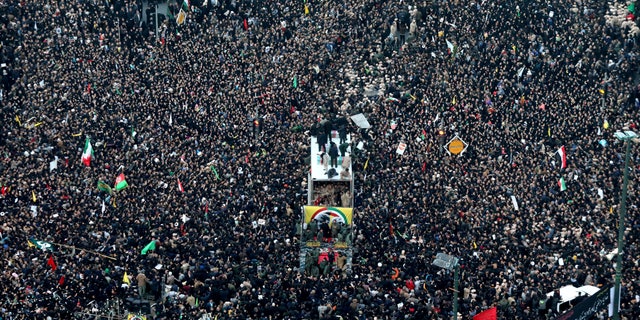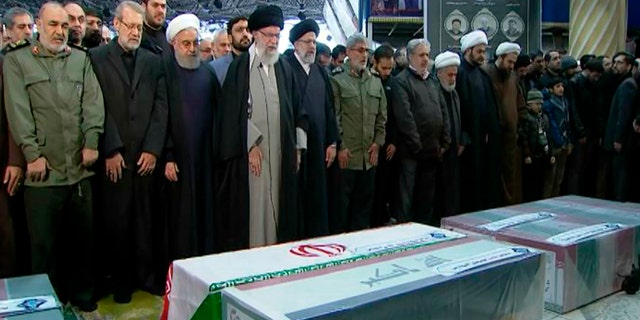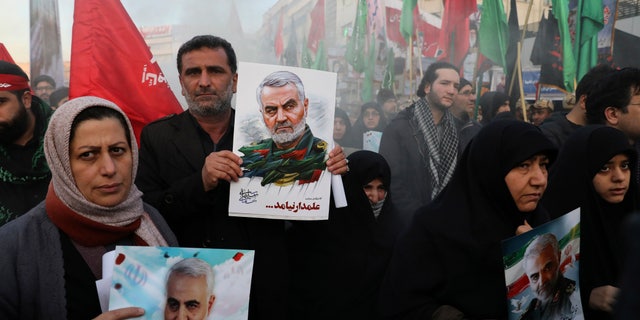
NEW
YORK (AP) — Four years after President Donald Trump drove the rules of
politics over a cliff to win the Republican presidential nomination and
ultimately the White House, Democrats will go through their own version
of the same test.
In
less than a month, Democratic voters will begin the formal process of
sifting through a historically large field of candidates. The options
include progressives who have inspired energy — and strong opposition —
by rejecting traditional party politics and pushing for fundamental
changes to America’s political, social and economic systems. Voters
could pick the oldest nominee in the party’s history — or the youngest.
Ironies abound at the outset of the Democratic primary.
The
oldest candidate at 78, Vermont Sen. Bernie Sanders, has a loyal
following among young voters but has yet to prove he can build a broader
coalition. Older voters, meanwhile, have shown interest in Pete
Buttigieg, the 37-year-old former mayor of South Bend, Indiana, whose
moderate vision has been greeted with skepticism by many fellow
millennials.
And a party that prides itself on valuing diversity is contending with a top tier that is all white and mostly male.
The
battle for the White House will unfold amid a great political
realignment that is disrupting decades-long political alliances and
further dividing America by education, gender and race. That means the
election will likely serve as a referendum not only on the candidates,
but also the country and its definition of the American presidency.
Some
of Trump’s most influential allies say he is ready and willing to make
2020 the nastiest presidential contest in living memory.
Steve
Bannon, a former White House adviser who has long fanned the flames of
Trump’s scorched-earth politics, indicated that Trump would lean more
aggressively into populism and nationalism over the coming year. And he
offered a warning to Democrats who have engaged in a largely polite
nomination fight so far: The “pillow fight” is almost over.
“This will be one for the ages. You’re going to get full Trump at max speed,” Bannon told The Associated Press.
Trump
and his massive political machine are an ever-present force in the
Democratic contest. The most important question each candidate must
answer is why they are best positioned to defeat a president many in the
party consider an existential threat to democracy.
Trump
has already hurled personal and policy attacks at his Democratic
opponents, even inviting assistance from foreign governments to defeat
them. And with his surprise move last week to strike Gen. Qassem
Soleimani, Trump showed how he can use the powers of the presidency to
scramble American politics in an instant.
In
a race that was already certain to be brutish, Trump’s decision to
order the attack prompted some Democratic candidates to suggest he may
have done so to divert attention from his impeachment trial.
The
urgent question of which Democrat will ultimately challenge Trump will
take months to resolve. The winnowing process formally begins with
Iowa’s Feb. 3 caucus and ends at the party’s mid-July national
convention after every state and U.S. territory holds its own primary
contest.
The
candidates represent the ideological diversity of an evolving Democratic
Party that is teetering on the edge of its own civil war, united if
only by overwhelming disdain for Trump.
Former
Vice President Joe Biden and Buttigieg represent the party’s moderate
wing, favoring a more cautious shift leftward on core issues like health
care, education and immigration. On the other side, Elizabeth Warren, a
70-year-old progressive Massachusetts senator, and Sanders, a
self-described democratic socialist, are fighting for transformational
changes including a shift to a single-payer health care system.
At
the same time, one of the richest men in the world, former New York
Mayor Michael Bloomberg, is trying to use his fortune to rewrite the
rules of primary politics. The $50 billion man, who registered as a
Democrat little more than a year ago, will ignore the first four states
on the primary calendar and focus instead on more than a dozen Super
Tuesday states in early March.
Political
operatives are skeptical, and many progressives are disgusted, yet the
strategy promises to complicate and prolong the bitter primary season.
Each Democratic faction is convinced that the other will trigger the very thing they fear most: Trump’s reelection.
“If
we nominate a candidate that I would describe as far left, extreme
left, I think that unfortunately, a lot of union members will just not
get there,” said Biden supporter Harold Schaitberger, the general
president of the International Association of Firefighters, who
specifically warned Democrats against nominating Sanders or Warren.
The
case for a moderate Democrat lies with the belief that white,
working-class men in a handful of states will largely decide Trump’s
fate in November.
Non-college-educated
white men shifted sharply away from the Democratic Party in 2016,
fueling razor-thin victories for Trump in three states that previously
made up the Democrats’ “blue wall”: Michigan, Pennsylvania and
Wisconsin. If Trump can hold same states again in 2020, he will return
to the White House for another four years.
Schaitberger
fears that some Democrats don’t appreciate the dire nature of the
situation that continues in the Midwest, where many of his union members
remain concerned by the leftward shift of the Democratic Party.
“It
doesn’t matter if we get 10 million more votes in California or 4
million more votes in New York or Massachusetts, you gotta be able to
come up in the battlegrounds with an electoral victory,” Schaitberger
said, pointing to Michigan, Pennsylvania, Wisconsin and Florida as the
states that matter most.
Alexandra
Rojas, executive director of the liberal group Justice Democrats, feels
just as strongly that her party must nominate a “bold progressive” like
Sanders or Warren to take back the presidency. She and thousands of
like-minded activists are fighting Biden and Buttigieg’s candidacies,
outraged by their reliance on wealthy donors and their refusal to
embrace transformative domestic policies like Medicare for All, which
would replace the U.S. private insurance system with free
government-backed health coverage for all Americans.
“We’re fighting like we have nothing to lose,” Rojas declared.
She
predicted that Democrats would ultimately come together after an
explosive primary fight. Given several factors working in the Republican
president’s favor, the Democrats’ feuding factions have no choice but
to unite if they hope to take back the White House.
Rarely
in modern political history has an incumbent president failed to win
reelection in the midst of economic growth. And while there is debate
about the strength of the U.S. economy, there is no debating the
numbers: unemployment rates and the stock market are better today than
when Trump took office.
Meanwhile,
Trump amassed the largest political fortune in U.S. history heading
into an election year, which he’s already using to construct a massive
political machine. Backed by more than $100 million in his campaign
account to begin the year, his team insists it can expand the
traditional political battleground this fall to compete in
Democratic-leaning states like Minnesota, New Mexico and even Oregon.
While
he is optimistic, evangelical leader and Trump confidant Jerry Falwell
Jr., the president of Liberty University, said it’s too early to predict
a Trump electoral landslide. But he’s calling on all Republicans to
embrace the Trump playbook.
“He’s
teaching Republicans a lesson that I hope they learn — that nobody’s
going to support them if they continue to be so diplomatic and so,
what’s the word I’m looking for? I mean they act like royalty, like it’s
beneath them to get down in the mud and fight,” Falwell said in an
interview. “The people have been looking for somebody who will get down
in the mud and fight, and wade in up to their waste. Trump’s the first
one who’s the done that.”
Indeed,
Trump has eagerly attacked anyone and everyone who has criticized his
personal style or governing decisions, even members of his own
administration at times. He has already used ethnic slurs to go after
Warren, raised questions about Sanders’ age, falsely called his rivals
socialists, and openly encouraged foreign governments — namely Ukraine
and China — to dig up dirt on Biden.
As
his political base cheers, such tactics threaten to inflict lasting
damage on Trump’s standing with some voters — especially women.
Democrats
scored sweeping victories in the 2018 and 2019 as college-educated
women, particularly in America’s suburbs, turned their backs on Trump’s
GOP. At the same time, there is evidence that younger voters and
minorities are both energized and repelled by Trump entering the new
year.
Bannon
insisted the GOP has become the “working-class party” under Trump,
although he has some concern about Trump’s standing with working-class
women. His more serious concern, however, lies with the narrow, but
vocal slice of establishment-minded Republicans who are fighting his
reelection.
He
referenced the recent birth of an anti-Trump group dubbed the Lincoln
Project, led by veteran Republican strategists who are planning a
nationwide campaign to convince disaffected Republicans and independent
voters to vote Democrat. The group’s leadership features conservative
attorney George Conway, who is the husband of Trump’s chief White House
counselor Kellyanne Conway.
“We
need the Republican establishment on board,” Bannon said, noting that
Trump essentially won the presidency because of less than 80,000
combined votes across Michigan, Pennsylvania and Wisconsin — “an inside
straight,” he called it.
“If these guys can peel off 3% or 4%, that’s going to be serious,” he said of Trump’s Republican rivals.
Yet
for all the talk of shifting voting blocs, intra-party fights and what
will almost certainly be the most expensive campaign in the history of
the world, Bannon believes that Trump’s fate will ultimately be decided
by one man.
“Only Trump can beat Trump,” he said.





















